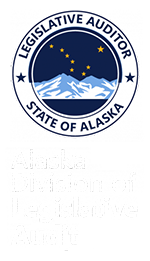| SUMMARY OF: | A Special Report on the Department of Community and Economic Development, Guides and Transporters, October 16, 2003. |
Purpose of the Report
In accordance with Title 24 of the Alaska Statutes and a special request by the Legislative Budget and Audit Committee, we have conducted a review of various issues related to guide and transporter activities. Specifically, we evaluated: the level of impact the absence of a professional licensing board for guides and transporters has had in the enforcement of guiding statutes; the appropriateness of the fines and other enforcement mechanisms currently available; and, the adequacy of activity reports.
Report Conclusions
With the termination of the Big Game Commercial Services Board (BGCSB), oversight of licensed guides, assistant guides, and transporters has been left, for the most part, to the various governmental land-owner agencies at the state and federal level: (1) the National Park Service; (2) the U.S. Fish and Wildlife Service; (3) the U.S. Forest Service; (4) the Bureau of Land Management; and, at the state level, (5) the Department of Natural Resources’ Division of Mining, Land and Water.
In this decentralized, uncoordinated regulatory climate, we were repeatedly told by various agencies that they would welcome a more vigorous, centralized licensing and regulatory board in order to better carry out oversight over transporters and, to a lesser extent, licensed guides.
Guiding activities that take place in national parks, wildlife refuges, and forests were, with the exception of transporter activity, still highly regulated. Staff of the National Park Service, U.S. Fish and Wildlife Service, and U.S. Forest Service – utilizing many of the operating restrictions and requirements that were part of BGCSB regulations – has put in place systems emphasizing hunter safety and maximization of the “wilderness experience.” To a large extent, these agencies also provide an avenue for handling client complaints.
Most guiding activity takes place on state land. This activity is regulated primarily under the guiding statutes and regulations initiated after the sunset of BGCSB. Guiding is being done with less emphasis on consumer protection or hunter-client safety.
Annual activity reports from transporters are sufficient for occupational licensing purposes for which they are being used. Although the reporting requirements for guides is relatively more stringent, we do not see a clear reason why guide activity information needs to be collected as often as is currently required.
Findings and Recommendations
Recommendation No. 1
The legislature should consider enhancing the public protection and consumer safety aspects of current guide services statutes. Additionally, the legislature should consider reestablishing a guide/transporter services licensing board.
After BGCSB ceased to operate at the end FY 95, new statutes and associated regulations were put in place by the legislature and the Department of Community and Economic Development (DCED), respectively. The statutes and regulations set the parameters for guiding practices in Alaska. With the new statutes and regulations, key requirements and standards which had previously existed under the auspices of the board were no longer in place. Many of the omitted requirements were key to enhancing consumer protection and safety. Additionally, some of the missing requirements promoted more compliance among guides and transporters with land and game management requirements.
Revisions to current state law and regulation could put back in place important consumer protection and hunter safety elements that previously existed but are currently absent. While a guiding industry oversight board is not necessary to address the concerns set out above, a licensing-oriented board will likely provide a more dynamic regulatory regimen – allowing the revision of regulations on a regular basis to enhance professionalism by guides, consumer protection, and hunter safety. Accordingly, we further recommend that the legislature consider amending the current guide and transporter statute to reestablish a guide service licensing board.

